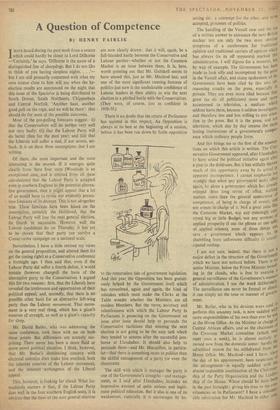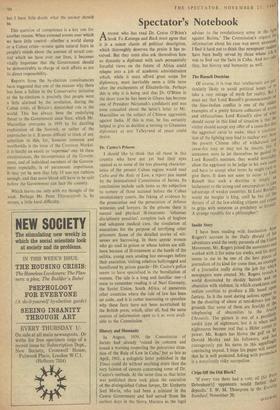A Question of Competence
By HENRY FAIRLIE T HAVE heard during the past week from a source 'which could hardly be closer to Lord Dilhorne —`Certainly,' he says, 'Dilhorne is the name of a distinguished line of sheepdogs. But I do not like to think of you having sleepless nights. . .
but I am still primarily concerned with what my own source close to him will say when the by- election results are announced on the night that this issue of the Spectator is being distributed to South Dorset, South Northants, Chippenham and Central Norfolk. 'Another haul, another good pull on the rope, and we will be there': that should do for most of the possible outcomes.
Most of the pre-polling forecasts suggest: (i) that the Conservatives will do neither very well nor very badly; (ii) that the Labour Party will do better than for the past year; and (iii) that the Liberals will suffer a real, if not severe, set- back. It is on these three assumptions that I am writing.
Of them, the most important and the most interesting is the second. If it emerges quite clearly from these four seats (Woodside is an exceptional case, and is omitted from all these calculations) that the Labour Party is accepted even in southern England as the potential alterna- tive government, then it might appear that a lot of us would have to revise our evidently prema- ture forecasts of its decease. This is not altogether true. These forecasts have been based on the assumption, certainly the likelihood, that the Labour Party w ill lose the next general election, its fourth in succession. However well the Labour candidates do on Thursday, it has yet to be shown that their party can survive a Conservative campaign on a national scale.
Nevertheless, I have a little revised my views on the general proposition, and uttered them (to get the timing right) at a Conservative conference a fortnight ago. I then said that, even if the Labour Party did suffer a fourth defeat, it would remain (however changed) the basis of the alternative party to the Conservatives. I argued this for two reasons: first, that the Liberals have revealed the irrelevance and opportunism of their political appeal; and, secondly, that there is no possible other basis for an alternative left-wing party than the Labour movement. That move- ment is a very real thing, which has a giant's reserves of strength, as well as a giant's capacity for sleep.
Mr. David Butler, who was addressing the same conference, took issue with me on both these points. But differences are scarcely sur- prising. There never has been a more fluid or more novel political situation. I think, however, that Mr. Butler's dominating concern with electoral statistics does make him overlook both the inherent reserves of the Labour movement, and the inherent nothingness of the Liberal appeal.
This, however, is looking far ahead. What im- mediately matters is that, if the Labour Party does well in the four southern English seats, it is obvious that the lines of the next general election are now clearly drawn: that it will, again, be a full-blooded battle between the Conservative and Labour parties—whether or not the Common Market is an issue between them. It is, here, worth pointing out that Mr. Gaitskell seems to have sensed this, just as Mr. Macleod has; and one of the most significant running features of politics just now is the unshakeable confidence of Labour leaders in their ability to win the next election in a pitched battle with the Conservatives. (They were, of course, just as confident in 1958-59.) There is no doubt that the return of Parliament has assisted in this respect. An Opposition is always at its best at the beginning of a session, before it has been run down by futile opposition to the remorseless tide of government legislation. And this year the Opposition has been gratuit- ously helped by the Government itself which has committed, again and again, the kind of mistakes which must make the Clerks at the Table wonder whether the Ministers are all maiden Members. But the verve, accuracy and relentlessness with which the Labour Party in Parliament is pouncing on the Government on issue after issue should help to persuade the Conservative tacticians that winning the next election is not going to be the easy task which they tended to assume after the successful jam- boree at Llandudno. It should also help to persuade them—and Mr. Macmillan, in particu- lar—that there is something more to politics than the skilful management of a party (or even the electorate).
The skill with which it manages the party is one of the Government's strengths—and manage- ment, as I said after Llandudno, includes an impressive amount of quite serious and legiti- mate political education. But it also is one of its weaknesses, especially if it encourages its be- setting sin : a contempt for the other, and more accepted, processes of politics.
The handling of the Vassall case and the use of a written answer to announce the next British nuclear test are only the two most obvious symptoms of a carelessness for traditional opinion and traditional carriers of opinion which has always (in its off moments) marked this administration. I will digress for a moment, but by way of example. The Government has been made to look silly and incompetent by the Press in the Vassall affair, and many spokesmen of the Government have been riled by this into un- reasoning attacks on the press, especially to private. They are even more riled because they grow (as do all politicians) more and more accustomed to television, a medium which seldom hurts them, because it seldom investigates, and therefore less and less willing to pay atteu" tion to the press. But it is the press, and not television, which day by day creates the more lasting impressions of a government's compel' ence which ordinary people form.
And this brings me to the first of the assume' lions on which this article is written. The Colt' servative Government appeared, after LlanduchW, to have seized the political initiative again after a year in the doldrums. But it has wilfully thrown much of this opportunity away by its actual or apparent incompetence. I cannot 'emphasise W° strongly that when any government seeks oiliee again, let alone a government which has already enjoyed three long terms of office, nothing, matters more than the general appearance or, competence, of being in charge of events, an o not events in charge of it. Not a great issue like the Common Market, not any cunningly c°°: trived big or little Budget, not any amount 01 applied prosperity (I use the phrase as one talks of applied science), none of these things can save a government which appears to be shambling from unforeseen difficulty to unanti- cipated mishap.
I am not sure, indeed, that there is not a major defect in the structure of the Government which we have not noticed before. There is ne senior Minister, below the Prime Minister brood" ing in the clouds, who is free to exercise a general surveillance of the Government's manner of administration. I use the word deliberately The surveillance can never be formal or direct; it can simply set the tone or manner of govern. ment.
Mr. Butler, -who in his devious ways used :2 perform this uncanny task, is now saddled wifP more responsibilities of his own than ever he was, at the Home Office. As the Minister in charge 0'; Central African affairs, and as the chairman of the Common Market committee (which mat meet once a week), he is almost entirely re- moved now from the domestic scene: hardly the advertised reason for his withdrawal from the Home Office. Mr. Macleod—and I have, sine! the day of his appointment, been suspicious 01 the arrangement—is equally saddled with the almost impossible combination of the Chairman- ship of the Party Organisation and the Leader' ship of the House. Where should he have been in the past fortnight: giving his time to the con- stituencies or to Parliament? I have a consider' able admiration for Mr. Macleod in either sole'
but i have little doubt what the answer should be.
This question of competence is a key one for another reason. When external events over which we have little control--whether a world slump or a Cuban crisis—arouse quite natural fears in people's minds about the amount of actual con- trol which we have over our lives, it becomes vitally important that the Government should be demonstrably in charge of such affairs as are its direct responsibility.
Reports from the by-election constituencies have suggested that one of the reasons why there has been a failure in the Conservative initiative at the by-elections is precisely that people were a little alarmed by the revelation. during the Cuban crisis, of Britain's diminished role in the world. This has always been the underlying threat to the Government since Suez. which Mr. Macmillan overcame in 1959 by his dazzling exploration of the Summit, or rather of the approaches to it. It seems difficult to think of any substitute to this, for, however immense and worthwhile is the issue of the Common Market, it is hardly an exotic or 'supermac' one. In these circumstances, the incompetence of the Govern- ment, and of individual members of the Govern- ment especially, is of paramount importance. It may yet be seen that July 13 was not ruthless enough, and that more blood will have to be spilt before the Government can face the country.
Which leaves me only with my thought of the week. Perhaps Mr. Peter Thorneycroft is, by nature, a little local difficulty.











































































 Previous page
Previous page